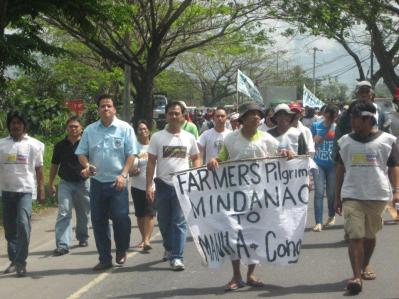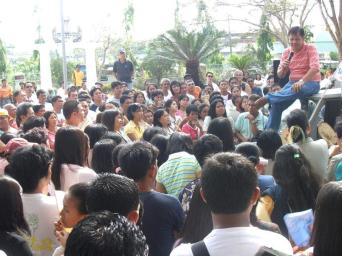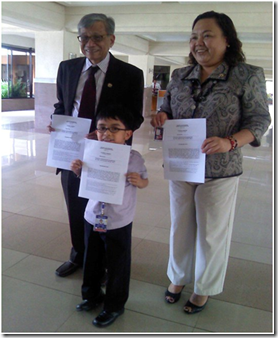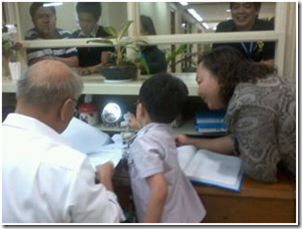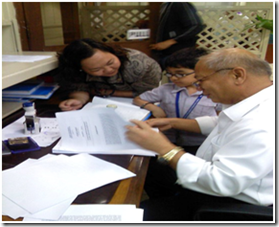Legal Notes of Representative Kaka J. Bag-ao, AKBAYAN Partylist
Simplifying the Senate Rules on Impeachment Trials
What is the nature of the impeachment proceedings before the Senate? How will the trial proceed? What are the salient features of the Senate Rules?
The impeachment trial of Supreme Court Chief Justice Renato Corona has already begun and the people are eager to watch, learn and analyze the ongoings. Hence, it is just but fitting that a short rundown of the Senate rules on impeachment trial be made so that the ordinary citizen may be apprised of the rules that govern this all-important proceeding which would ultimately affect the nation and the people’s lives.
I. Impeachment Proceedings as “Sui Generis”
Before tackling the Senate rules, it is important to understand the nature of the impeachment trial for it has significant implications. There are two views.
The first view is that impeachment proceeding is political in nature. Historically, impeachment proceedings in England and the United States, from which several of our Constitutional provisions relating to impeachment were borrowed, had been dominantly political in nature. In fact, Sections 1-3, Article XI of the Philippine Constitution allocates the power of impeachment to Congress—the right to accuse is exclusively lodged before the House of Representatives, while the sole power to try and decide all cases of impeachment belongs to the Senate—both of which are political branches of the government. The framers of the Constitution delegated the power over impeachment trials before a political branch, rather than the judiciary, because they chiefly relate to injuries done to the society itself. The Senate, whose members are elected representatives of the people who act on the basis of political consideration, was deemed as the “most fit depositary of this important trust” because its members are representatives of the people.[1]
Second, the impeachable offenses are political and not necessarily criminal offenses. Thus, among the grounds of impeachment are “other high crimes” or “betrayal of public trust”. The offenses are also prosecuted by members of the House of Representatives, also elected officials of the people. Further, the consequences of impeachment are political punishments and not necessarily penal in character.
Third, the courts have no power to review the decisions of the impeachment body because they are considered as political in nature and, thus, non-justiciable except when there are clear violations of the Constitutional provisions on impeachment. Moreover, it is most likely possible that after the successful impeachment proceedings before the Senate, a separate criminal or administrative case would be filed before the appropriate regular courts. The framers of the Constitution deemed it best to have two separate forums before which these cases can be filed to prevent any form of bias and influence on the separate cases. Lastly, a review by the courts of the decisions of the Senate as an impeachment body would be inconsistent with the principle of Checks and Balances.[2]
The second view, adhered to by some legal scholars like former Justice Isagani Cruz, characterizes the impeachment proceedings as “in a sense judicial and penal in character,” hence, akin to criminal proceedings. It is stated in this view that most of the grounds for impeachment are penal in character, such as treason, bribery, graft and corruption, and if the impeached official is found guilty, he may suffer a penalty of removal from office and disqualification to hold office—some of the penalties adjudged to criminal offenders in ordinary cases.[3]
It is submitted that the correct view of the nature of impeachment proceedings is neither purely political nor criminal in character, rather, it is “sui generis,” which means “a class of its own”. In the words of former Justice Reynato Puno, it is a “commixture of political and judicial components in our reengineered concept of impeachment xxx which has been shaped by our distinct political experience especially in the last fifty years.”[4]
The importance of distinguishing the nature of impeachment proceedings has its bearing on its legal implications. First, the interpretation of the Senate rules on impeachment proceedings should be made in a liberal manner and technicalities should be set aside because it is not purely a criminal proceeding. Second, the Constitutional rights of the accused in ordinary proceedings such as the right to due process and right against self-incrimination still apply. Third and most important, the nature of the impeachment proceedings will determine the required quantum of evidence required for convicting an impeached official.
II. Procedure in the Impeachment Trial
Sections 1-3, Article XI of the Constitution lay down the rules on impeachment proceedings. The Constitution further obliges Congress to promulgate its own rules to effectively carry out the process. Hence, the House of Representatives approved the Rules of Procedure in Impeachment Proceedings on 3 August 2010,[5] while the Senate approved Resolution No. 39 (Resolution Adopting the Rules of Procedure on Impeachment Trials) on 23 March 2011. Since the Articles of Impeachment have already been transmitted to the Senate, there is no longer any need for discussing the House Rules and only the salient features of the Senate Rules will be discussed here.
What is the role and duty of the Senate upon receipt of Articles of Impeachment?
Section 3 (6), Article XI of the Constitution states that “The Senate has the sole power to try and decide all cases of impeachment.” Hence, all questions regarding the interpretation of the meaning of the grounds for impeachment and assessment of the evidence—which are unquestionably political in nature—are not subject to review by the courts except for non-compliance with the procedural requirements of the Constitution.
Once the Senate receives the Articles of Impeachment from the House of Representatives, the Senate President shall inform the House of Representatives that the Senate shall take proper order on the impeachment and ready to receive the prosecutors.
What are the powers of the Senate?
The Senate shall have the following powers:
a. Compel the attendance of witnesses;
b. Enforce obedience to its orders, mandates, writs and judgments;
c. Preserve order;
d. Summarily punish contempt of, and disobedience to its authority, orders, mandates, writs, or judgments; and
e. Make all lawful orders, rules, and regulations which it may deem essential or conducive to the ends of justice;
Who shall preside in impeachment proceedings?
The Senate President shall be the Presiding Officer except when the President is on trial in which case the Chief Justice of the Supreme Court will preside. The Presiding Officer shall have the power to make and issue all orders, mandates, and writs, and to make and enforce such other regulations and orders in the premises.
Can the Presiding Officer rule on any questions on evidence?
Yes, the Senate President, as Presiding Officer, may rule on all questions on the materiality, relevancy, competency or admissibility of evidence and incidental questions. The ruling of the Senate President on these matters shall be considered as the ruling of the Senate as a body unless he shall submit any such question to a vote of the members of the Senate or any member of the Senate shall ask that a formal vote be taken. In this case, a vote shall be taken and a majority vote shall prevail. This was what happened during the impeachment case of former President Joseph Estrada where the senators voted on whether to open the second envelope which allegedly contained the evidence regarding the Velarde account. In the Estrada case, a majority of the senators decided not to open the second envelope which enraged the nation which eventually resulted in EDSA II.
How will the person impeached be notified of the Articles of Impeachment?
A Writ of Summons shall be issued to the person impeached notifying him/her of the Articles of Impeachment, the date and time of his/her appearance before the Senate, and ordering him/her to file his/her Answer within ten (10) days from receipt of the notice. The prosecutors may file a Reply within five (5) days from receipt of the Answer.
On the date and time fixed on the Writ of Summons, the person impeached shall be called to appear and answer the Articles of Impeachment against him.
What happens if the person impeached fails to appear on the date fixed by the Senate?
The trial shall proceed nevertheless upon a plea of not guilty. Note that the rules allow that the person impeached may appear by himself or through an agent or counsel. It is also noted that the person impeached still enjoys the Constitutional right against self-incrimination and right to due process. In any case, the impeachment trial will then proceed.
When will the impeachment trial proceed?
Unless otherwise provided, the trial will start on the day fixed by the Senate, particularly, at 2:00 in the afternoon, and the sessions will continue from day to day (except Saturday, Sundays and nonworking holidays) until final judgment shall be rendered. (In this impeachment trial, the Senate will be conducting hearings from Monday to Thursday only.)
Will the legislative business of the Congress be totally suspended pending the impeachment trial?
No. With respect to the House of Representatives, the ordinary legislative business will continue because only the 11-member panel of prosecutors will be handling the case before the Senate. Notwithstanding the trial, the members of the panel of prosecutors are not prevented from continuing with their legislative advocacies in the House of Representatives. On the other hand, the members of the Senate may continue their legislative affairs in the morning or when the trial is not in session.
How long will it take to finish the trial?
It is estimated that the trial may last from 3 to 5 months, depending on the circumstances of the case, such as when the person impeached will resign from his/her post which may result in the termination of the trial. This was exactly what happened to the impeachment proceedings of former Ombudsman Merceditas Guttierez who resigned at the height of the impeachment proceedings against her. It is also recalled that the impeachment proceedings of former President Joseph Estrada was abandoned in the middle of the trial.
Can the impeachment trial proceed despite the resignation of the person impeached during the trial?
It is submitted that the trial may still proceed for purposes of ferreting the truth and ascertaining accountability. Further, his/her disqualification to hold public office in the future may still be a proper subject for the impeachment body to tackle.
What is the role of the House of Representatives in the Trial?
The members of the House of Representatives shall act as the sole prosecutors in the impeachment trial through a panel of 11 members elected by a majority vote in plenary under the rules adopted by the House of Representatives. Under the Senate Rules, however, it allows for the appearance of private counsels to act as prosecutors provided that they shall be under the control and supervision of the panel of prosecutors of the House of Representatives.
How will the trial proceed?
The case, on each side, will be opened by one person. The final argument on the merits may be made by 2 persons on each side (unless otherwise ordered by the Senate upon application for that purpose), and the argument shall be opened and closed on the part of the House of Representatives.
How will witnesses be examined?
Witnesses shall be examined by one person on behalf of the party presenting them, and then cross-examined by one person on the other side.
Can a Senator ask a question on the witness?
Yes, a Senator can put a question to a witness, prosecutor, counsel, and even to the person impeached. The Senator may also offer a motion or order, in writing, which shall be submitted to the Presiding Officer.
Can a Senator be called as a witness?
Yes, and he/she shall be sworn and give the testimony standing in his/her place.
May parties or counsels object to any question propounded by a prosecutor, counsel or Senator?
Yes. All motions, objections, requests, or applications whether relating to the procedure of the Senate or relating immediately to the trial made by the parties or counsel shall be argued and addressed to the Presiding Officer.
What happens after the presentation of the final arguments by the prosecutors as well as the counsels of the person impeached?
After the completion of the trial for all of the Articles of Impeachment, the Senators shall vote on the final question on whether or not the impeachment is sustained. The Presiding Officer shall first state the question and, thereafter, each Senator shall rise and answer: “guilty” or “not guilty”. The vote of the Senate President, when acting as the Presiding Officer, shall be taken after all the Senators have stated their votes. Each Senator may explain his/her vote within 2 minutes.
How shall the voting of Senators be made?
On the final question whether the impeachment is sustained, the yeas and the nays shall be taken on each Article of Impeachment separately. If the impeachment shall not be sustained by the vote of two-thirds of all the Members of the Senate, a judgment of acquittal shall be entered. If the person impeached in such Articles of Impeachment shall be convicted upon the vote of two-thirds of all the Members, the Senate shall proceed to pronounce judgment of conviction. Hence, a conviction on any of the Articles of Impeachment shall be enough to convict the impeached officer.
May the Articles of Impeachment be divisible?
No. The judgment shall be made only after all the arguments of both parties have been concluded. Further, the voting of the Senators shall continue until all the Articles of Impeachment have been read and voted thereon by each Senator.
Is a Motion for Reconsideration allowed?
No. A motion to reconsider the vote by which the Articles of Impeachment is sustained or rejected shall not be in order. In fact, the results of the voting of the Senators shall not be reviewable by the courts as the same is considered political matters and beyond the powers of judicial review. The judgment is therefore final and unappealable.
What is the consequence of conviction in any of the articles of impeachment?
The person impeached shall have a judgment which shall not extend further than removal from office and disqualification to hold any public office under the Republic of the Philippines.
May the convicted public officer be pardoned by the President?
No. The Constitution specifically states that impeachment conviction may not be subject to pardon by the President.
After the Senate conviction, may the convicted public officer be prosecuted in ordinary suits?
Yes, the convicted public officer may be prosecuted in ordinary criminal or civil actions in regular courts, as the case may be. When criminally prosecuted, the person cannot plead the defense of double jeopardy.
In case of conviction in ordinary criminal cases, can the convicted person be pardoned by the President?
In this instance, the convict may be pardoned by the President as in ordinary cases. This is what happened to former Joseph Estrada who was subsequently prosecuted and convicted for plunder before the regular courts of justice after the aborted impeachment trial before the Senate. After his conviction, former President Gloria Arroyo granted Joseph Estrada executive clemency and, thus, he was released from jail. Subsequently, Joseph Estrada again ran for President in the 2010 national elections as he was not barred from running because there was no conviction made during the aborted impeachment trial.
III. Other Salient Features and Gray Areas of the Senate Rules
All Proceedings are Public
Since the issue in impeachment proceedings involves national interest owing to the fact that it is the people through their representatives who are to decide in their sovereign capacity, all the proceedings thereon shall be open to the public.
Political Neutrality
Senators, as judges in the whole proceedings, shall observe “political neutrality”—defined as the exercise of a public official’s duty without unfair discrimination and regardless of party affiliation or preference—during the course of the impeachment trial. In line with this, they shall refrain from making any comments and disclosures in public pertaining to the merits of a pending impeachment trial. This “gag order” also applies to the prosecutors, person impeached and to their respective counsels and witnesses. However, being a public issue which concerns national interest, academic discussions on the issue, rules of the impeachment proceedings, issues already presented before the Senate, as well as the political consequences on the impeachment trial may be the subject of public debates. Again, the public has the right to know all proceedings in the impeachment trial.
Evidence Necessary for Conviction
There are four (4) types of quantum of evidence required in arriving at a decision depending on the nature of the proceedings. First, there is “proof beyond reasonable doubt” which is the moral certainty or that degree of proof which produces conviction in our prejudiced mind. This is the evidence required in criminal proceedings, and this is the most difficult to obtain. The second type, “clear and convincing evidence”, is that weight of evidence that is clear, positive, and convincing, going beyond mere preponderance of evidence. The third, “preponderance of evidence”, means the superior weight of evidence as determined by the Court considering all the facts and circumstances of the case including the witnesses’ manner of testifying, the nature of the facts to which they testify and personal credibility. This is the evidence required in civil cases. The last type, “substantial evidence”, refers to such amount of relevant evidence which a reasonable mind might accept as adequate to justify a conclusion. This is the evidence required in administrative cases, and is said to be the easiest to obtain.
As discussed above, the nature of impeachment proceedings is neither political nor criminal, and that it is “sui generis”. Not being a purely criminal proceeding, it does not require “proof beyond reasonable doubt” to convict a person impeached. Hence, the senators may use any quantum of evidence except for “proof beyond reasonable doubt” as basis for his vote in any of the articles of impeachment. This is also the view taken by most of the scholars in American jurisprudence in relation to impeachment proceedings.
Basis of Two-Thirds Vote
The Constitution requires that no person shall be convicted without the concurrence of two-thirds of all the members of the Senate. What does the phrase “all the members of the Senate” mean? Is it based on the full membership of the Senate, which is 24, or on the actual incumbent members? This has particular importance only when the number of seats in the Senate is not completely filled as in the present Senate which only has 23 incumbent members. There is no jurisprudence on the matter yet.
*** A lawyer by profession, AKBAYAN Rep. Kaka Bag-ao was the Convenor of the Alternative Legal Group, a network of NGOs providing legal support to marginalized communities. She was the legal counsel of the Sumilao farmers.
[1] Justice Reynato Puno’s Concurring and Dissenting Opinion in Francisco vs. House of Representatives, G.R. No. 160261, November 10, 2003,citing Alexander Hamilton and the case of Nixon vs. United States (38 506 US 224 (1993) 122 L ed 1 113 S Ct 732.
[2] Justice Reynato Puno’s Concurring and Dissenting Opinion in Francisco vs. House of Representatives, G.R. No. 160261, November 10, 2003,citing the case of Nixon vs. United States (38 506 US 224 (1993) 122 L ed 1 113 S Ct 732.
[3] Tupaz, Antonio, R. Fundamentals of Impeachment. 2001 Edition. Phoenix Press, pp. 19.
[4] Justice Reynato Puno’s Concurring and Dissenting Opinion in Francisco vs. House of Representatives, G.R. No. 160261, November 10, 2003.
[5] The Supreme Court decision in Francisco et al. vs. House of Representatives (GR No. 160261, 10 November 2003), states that Impeachment proceedings are initiated upon filing of the complaint and/or resolution and its referral to the Committee on Justice.


